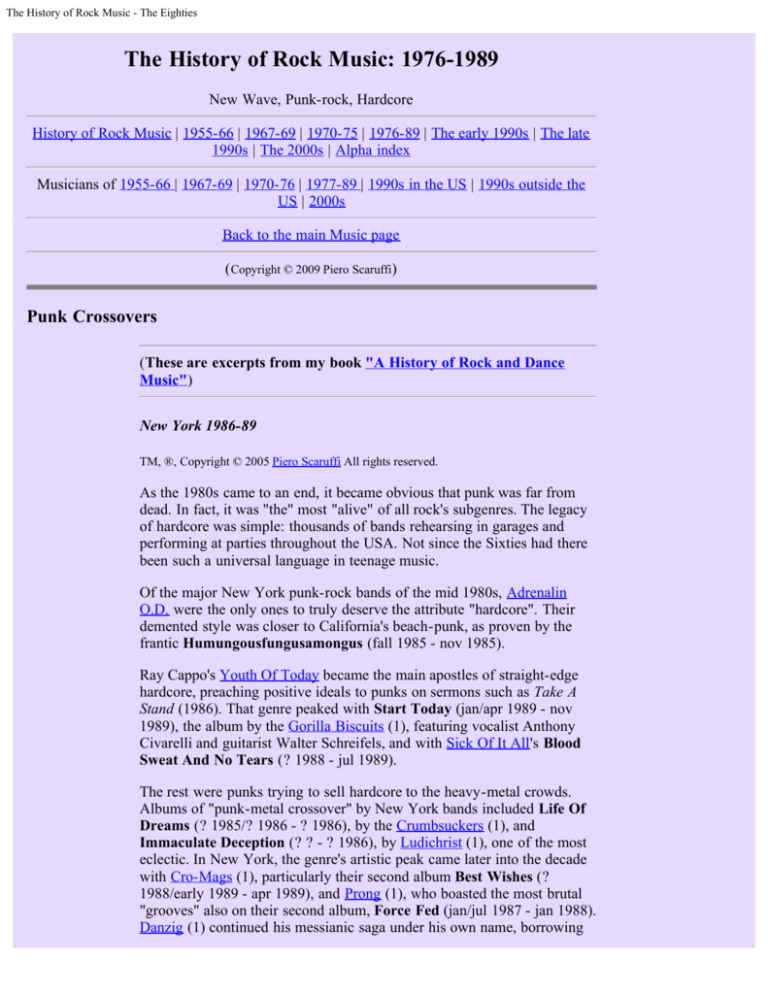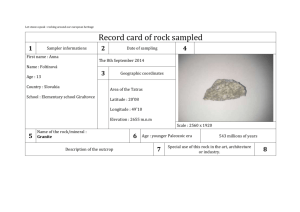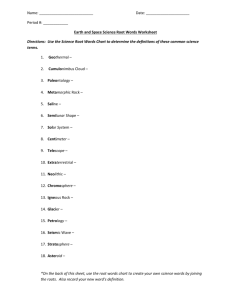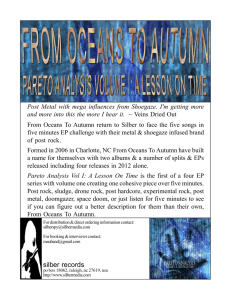
The History of Rock Music - The Eighties
The History of Rock Music: 1976-1989
New Wave, Punk-rock, Hardcore
History of Rock Music | 1955-66 | 1967-69 | 1970-75 | 1976-89 | The early 1990s | The late
1990s | The 2000s | Alpha index
Musicians of 1955-66 | 1967-69 | 1970-76 | 1977-89 | 1990s in the US | 1990s outside the
US | 2000s
Back to the main Music page
( Copyright © 2009 Piero Scaruffi)
Punk Crossovers
(These are excerpts from my book "A History of Rock and Dance
Music")
New York 1986-89
TM, ®, Copyright © 2005 Piero Scaruffi All rights reserved.
As the 1980s came to an end, it became obvious that punk was far from
dead. In fact, it was "the" most "alive" of all rock's subgenres. The legacy
of hardcore was simple: thousands of bands rehearsing in garages and
performing at parties throughout the USA. Not since the Sixties had there
been such a universal language in teenage music.
Of the major New York punk-rock bands of the mid 1980s, Adrenalin
O.D. were the only ones to truly deserve the attribute "hardcore". Their
demented style was closer to California's beach-punk, as proven by the
frantic Humungousfungusamongus (fall 1985 - nov 1985).
Ray Cappo's Youth Of Today became the main apostles of straight-edge
hardcore, preaching positive ideals to punks on sermons such as Take A
Stand (1986). That genre peaked with Start Today (jan/apr 1989 - nov
1989), the album by the Gorilla Biscuits (1), featuring vocalist Anthony
Civarelli and guitarist Walter Schreifels, and with Sick Of It All's Blood
Sweat And No Tears (? 1988 - jul 1989).
The rest were punks trying to sell hardcore to the heavy-metal crowds.
Albums of "punk-metal crossover" by New York bands included Life Of
Dreams (? 1985/? 1986 - ? 1986), by the Crumbsuckers (1), and
Immaculate Deception (? ? - ? 1986), by Ludichrist (1), one of the most
eclectic. In New York, the genre's artistic peak came later into the decade
with Cro-Mags (1), particularly their second album Best Wishes (?
1988/early 1989 - apr 1989), and Prong (1), who boasted the most brutal
"grooves" also on their second album, Force Fed (jan/jul 1987 - jan 1988).
Danzig (1) continued his messianic saga under his own name, borrowing
The History of Rock Music - The Eighties
from the Doors and Black Sabbath for Danzig (? ? - aug 1988). The idea
began to stink (almost literally) with the Lunachicks, a punkette-group
heir to the Plasmatics' scum-rock.
Washington 1986-88
TM, ®, Copyright © 2005 Piero Scaruffi All rights reserved.
Washington's scene was soon overflowing with experimental punk bands.
Some of them (Soulside) were training grounds for future innovators. In
particular, Washington was the launching pad for two of the most
influential bands of the second half of the decade: Pussy Galore and
Fugazi.
Arguably one of the most inept bands of all times, Pussy Galore (2) played
blasphemous, obscene, irreverent, barbaric and often out-of-tune punkblues. The hoarse and demented vocals of Jon Spencer, the ridiculous
guitar strumming of Julia Cafritz and Neil Hagerty framed the subamateurish sound of the EP Groovy Hate Fuck (mar 1986 - ? 1986).
They moved to New York, where they added ex-Sonic Youth drummer
Bob Bert and keyboardist Cristina Martinez, and they tripled the absurdity
of their garage-sound. Thus, their first full-length, Right Now! (sep 1987 end 1987), sounded like Captain Beefheart meeting the Cramps and
Einsturzende Neubauten in a studio with defective microphones. Spencer
disassembled and "de-sematicized" rock'n'roll and then built a new syntax
based on the genre's illicit sounds, i.e. on its most subversive codes. And
carried out this semiotic operation while posing as a satanic pervert. Dial
M For Motherfucker (? ? - ? 1989) was even more meaningless and
pointless, but that was precisely the point. Pussy Galore begot an
impressive cast of alternative groups: Jon Spencer Blues Explosion, Royal
Trux, Bewitched, Boss Hog, etc. Never was an irrelevant entity made so
relevant by its irrelevance.
Unrest (23) were formed out of Washington by singer Mark Robinson and
drummer Phil Krauth. Tink Of S.E., later reissued as Fuck Pussy Galore
(aug 1986 - oct 1987), was an ambitious slab of progressive hardcore that
included several instrumental pieces and incorporated jazz and avantgarde
techniques. The extended musical vocabulary of Malcolm X Park (jul
1988 - oct 1988) and the transitional semi-pop of Kustom Karnal
Blackxploitation (? 1989 - feb 1990), and the addition of bassist Bridget
Cross, led into the group's pop phase. Despite their nervous filigree, the
songs of Imperial f.f.r.r. (jul 1991 - feb 1992) were, first and foremost,
splendid pop-soul-folk ballads, which, despite the rarefied arrangements
and the free-form dynamics, retained strong identities. Robinson was
applying the lessons of Van Morrison and Tim Buckley, not the lessons of
Fugazi. Whereas the mini-album Isabel Bishop (? 1992 - may 1993)
indulged in that impeccable format, the last album, Perfect Teeth (mar
1993 - aug 1993), was again bold and aggressive like the first one. Having
come full circle, Robinson dissolved Unrest and wasted his talent in a
series of projects that explored Tin Pan Alley's kitsch (Grenadine) and
synth-pop (Air Miami).
Fugazi (113) was the new project of Minor Threat's Ian MacKaye and
Rites Of Spring's Guy Picciotto. They abstracted hardcore punk-rock into a
The History of Rock Music - The Eighties
theatrical form of music, whose ethical and political commitment was as
deep as the aesthetic one. MacKaye, moral ascetic and dissolute artist
possessed by a supernatural force, was the driving engine, a sort of Jim
Morrison for the hardcore generation, propelled by a dissonant and
thundering accompaniment. The first two EPs, Fugazi (jun 1988 - dec
1988) and Margin Walker (dec 1988 - ? 1989), which made up the album
13 Songs, released in 1989, unleashed monster psychological tension to
fight a devouring existential fever. The terrorist attack carried out against
society by Repeater (jul/sep 1989 - mar 1990) was more cathartic than
destructive, and even presented a zen-like aspect. The two leaders and
their phenomenal rhythm section devised countless tricks to keep the
tension as spasmodic as possible. Now that he had acquired a new musical
language, MacKaye indulged in bending it like a chunk of clay to
materialize his inner ghosts. Steady Diet Of Nothing (jan 1991 - aug
1991), arguably their sonic masterpiece, replaced frenzy with cinematics:
songs were always in motion, typically in an obsessive crescendo,
fractured and deformed by numerous discontinuities. In On The Kill
Taker (dec 1992 - jun 1993) made the package more accessible by
bringing out the melody (that was hidden behind the pandemonium) and
polishing the guitar-vocals counterpoint. Finally, Red Medicine (jan 1995
- jun 1995) was the transfiguration of Fugazi: as they mastered the new art
of storytelling that they had invented, they proceeded to turn it into a
classical language. The sophisticated puzzle of timbres and arrangements,
the manic dynamics of pauses and rhythms, the acrobatic repertoire of shy
litanies and strident rants changed forever the context of hardcore music.
Royal Trux (103), i.e. keyboardist Jennifer Herrema and former Pussy
Galore guitarist Neil Hagerty, carried out a post-modernist program of
revisiting and deconstructing rock music, a program that encompassed
countless quotations from the Rolling Stones, Captain Beefheart and Jimi
Hendrix, as well as fueling them with the aesthetic excrements of the "no
wave". Royal Trux (? ? - ? 1988) revealed the duo's perverted passion for
disfiguring blues-rock and leaving only harmonic ashes behind them. It
was a tribute not to a genre (that was the vehicle) but to their generation of
stoned and drunk artists (that was the message). There was no music per
se: there were only subsonic litanies, limping rhythms and disjointed
accompaniment, that mirrored (on a very warped parallel universe) the
stereotypes of blues-rock. Twin Infinitives (oct 1989/jun 1990 - dec
1990), one of the milestone recordings of the era, a sort of Trout Mask
Replica for the grunge generation, toured an impassable jungle of clumsy
and puerile noises. Derailed by pseudo-jazz and pseudo-avantgarde
pretentions, its delirious pieces sounded like nuclear bacchanals via spastic
jamming. Lacking any sense of order or purpose, the album was a colossal
chaos of musical detours. The anarchic and illiterate art that had been
foreshadowed and incubated throughout the 1980s by the works of punkrock, the no wave, industrial music, and so forth, had reached the terminal
point. The two devastated psyches had forged a hyper-psychedelic form of
cubism. Royal Trux (? ? - oct 1992) marked a return to a more
conventional song format, and Cats And Dogs (early 1993 - jun 1993)
was virtually a sell-out, despite the knack for extravagant dynamics.
San Francisco 1985-89
TM, ®, Copyright © 2005 Piero Scaruffi All rights reserved.
The History of Rock Music - The Eighties
In the mid 1980s the Bay Area launched a melodic style of hardcore that
would be highly influential on the 1990s. Its leaders were Mr T Experience
(2), progenitors of Berkeley's "Gilman Street" scene, who harked back to
the Ramones' farcical tone and catchy refrains. The breakthrough album
was Everybody's Entitled To Their Own Opinion (jul 1986 - ? 1986),
but the better produced Milk Milk Lemonade (? ? - may 1992) is the one
that gave punk-pop its mass appeal.
The Dwarves (2) did not belong to any movement or scene, but they
played the funniest, reckless and most exuberant punk-rock of the era.
From their garage/psychedelic beginnings, they moved on to such inane
jokes as Blood Guts & Pussy (? 1989 - jul 1990) and Thank Heaven For
Little Girls (? ? - ? 1991), devoting themselves to forbidden dirty themes
in the tradition of Alice Cooper and Cramps, and populating their songs of
a disturbing crowd of sluts and perverts. But that was, after all, the
original, unadulterated, uncivilized spirit of rock'n'roll.
Los Angeles 1986-87
TM, ®, Copyright © 2005 Piero Scaruffi All rights reserved.
The leaders of Black Flag remained influential after the split. Greg Ginn
continued his virtuoso explorations (solo, with Gone, with Dos and with
October Faction), while Henry Rollins (22) emerged as one of the leading
voices of the hardcore generation.
A force of nature, Rollins built an awe-inspiring opus on his visceral
delivery, an excursion into intense vocal registers running the gamut from
Iggy Pop/Stooge to Captain Beefheart. Introspection, the object of his
manic quest, yielded the psychic hurricanes of Hot Animal Machine (oct
1986 - ? 1987), a milestone recording that turned the violence of hardcore
inside (towards the inner life) rather than outside (society). The pathos
owed quite a bit to guitarist Chris Haskett, who applied the eloquent styles
of Jimmy Page and Jimi Hendrix to crafting a new dramatic art of guitar
accompaniment. The steel framework of Life Time (nov 1987 - ? 1988)
and the brutal coldness of the mini-album Hard Volume (dec 1988 - nov
1989) offered an infernal fresco of the human condition via an
experimental sound that relied on jazz bass, psychedelic drums, atonal
guitar and dynamic tempos. Despite his ego, the Rollins Band was a
polycentric unit that was both tight and interactive, and the voice was
certainly not the only protagonist of their psychodramas. Songs that
appeared to be compact, massive units were actually composite,
fragmented structures. This was particularly true on End Of Silence (oct
1991 - feb 1992), a grunge monolith and a titanic effort, that was both
Rollins' supreme cry of desperation and a complex, multilateral stream of
consciousness. The instruments had the alienating effect of isolating
Rollins' grief, as if nobody was listening to him. A more streamlined and
controlled approach on Weight (dec 1993 - apr 1994) melted and welded
jazz passion and heavy-metal prowess, on top of Rollins' customary
deliriums.
In the second half of the decade, quite a few Los Angeles punk bands
debuted with a melodic style, from porno-punks Chemical People, to
The History of Rock Music - The Eighties
militant hardcore agitators NOFX.
L7 (2), featuring Suzi Gardner and Donita Sparks on guitars and Jennifer
Finch on bass, played a rough and blistering mixture of rock'n'roll, punkrock and heavy-metal, on L7 (? 1987 - ? 1988), whereas Smell The
Magic (? 1989 - sep 1990) turned to pop-metal. They found a magic
balance between the wild and the anthemic tones on Bricks Are Heavy (?
1991/early 1992 - apr 1992), particularly with the classic Pretend We're
Dead, one of rock's immortal refrains. They pioneered "foxcore" and
inspired the riot-grrrrls of California.
Pop-core 1986-89
TM, ®, Copyright © 2005 Piero Scaruffi All rights reserved.
Towards the end of the decade, when the style invented by Husker Du was
beginning to take over the hardcore scene, Boston boasted two of the most
successful acts: Evan Dando's Lemonheads (2), who became heroes with
the honest and sincere Hate Your Friends (? ? - ? 1987) and became
stars with It's A Shame About Ray (nov 1991/? 1992 - jun 1992), one of
the albums that signaled the mass acceptance of punk-rock; and Ken
Chambers' Moving Targets (1), whose punk spirit triumphed on Burning
In Water (jan 1986 - jun 1986) but was also tempered by the
contemporary folk-rock school of R.E.M. and Tom Petty. Chambers
continued his punk-pop mission with Bullet Lavolta.
Chicago's Screeching Weasel (2) were among the most effective and
entertaining, first with Boogadaboogadaboogada (oct 1988 - dec 1988), a
tour de force of clownish refrains that was also an indirect tribute to
Ramones and Buzzcocks, and then with My Brain Hurts (jul 1991 - ?
1991), one of the few works in this genre that was as melodramatic as
demented. Ben "Weasel" Foster impersonated the indifferent kid who has
understood nothing of life and society, and whose intellectual level can't
go beyond the provincial gossip, but the self-parodying tone harked back
to the original spirit of punk-rock and rock'n'roll.
The Didjits (1), from nearby Champaign, rediscovered frantic, anthemic
and epic rock'n'roll on albums such as Hey Judester (? ? - may 1988).
Alabama's Sex Clark Five (1) crafted a humble gem of punk-pop, Strum
& Drum! (? ? - ? 1987).
Goo Goo Dolls (1), from upstate New York, found the formula to sell
pop-core to the masses: on Hold Me Up (? ? - oct 1990) they fused the
Replacements' passionate rock'n'roll, Husker Du's punk-pop tunefulness
and crisp hard-rock production.
In Minnesota, the only band that capitalized on Husker Du's intuitions was
Arcwelder (1), although even their most accomplished albums, such as
Pull (? 1992 - feb 1993), never recovered Husker Du's magic touch.
The catchiest and most "retro`" of the punk-pop bands came from Seattle:
the Fastbacks (2) were the ultimate improvement over the ideas of
Buzzcocks and Ramones. Albums such as Very Very Powerful Motor (?
The History of Rock Music - The Eighties
? - ? 1990) and Answer The Phone Dummy (? ? - oct 1994) were
whirlwinds of childish singalongs, reminiscent of Phil Spector and the
girl-groups.
Punk-pop was initially an underground phenomenon but soon spread all
over the world. In Japan, Shonen Knife (1) made albums such as Pretty
Little Baka Guy (jul 1985/apr 1986 - ? 1986) that could be the ultimate
party music: superbly pointless, but irresistible.
Rogue folk 1985-86
TM, ®, Copyright © 2005 Piero Scaruffi All rights reserved.
In England, bands such as Pogues (1) and the Waco Bros applied the
principles of punk-rock to folk music. The Pogues were a folk ensemble
that played with devilish animosity, conveying the rancor and the rage of
the working class and of the lumperproletariat (and the savage manners of
the hooligans). Rum Sodomy And The Lash (? ? - aug 1985) and the EP
Poguetry In Motion (? 1985 - feb 1986) distorted the whole point of
square-dances and folksongs, turning them into orgiastic, drunk and
irreverent tirades. Their "rogue folk" influenced scores of bands (the
leftovers of the folk revival) but the Pogues themselves soon abandoned
the genre with the eclectic, almost pan-ethnic arrangements of If I Should
Fall From Grace With God (? 1987 - jan 1988).
Membranes (2), unorthodox disciples of Fall, boasted one of the most
defiant and confrontational attitudes, that translated into the memorable
psychotic bacchanals of The Gift Of Life (may 1985 - ? 1985), that even
flirts with jazz and ska, and Kiss Ass... Godhead! (? 1987 - jan 1988), on
a more humorous note.
The decade ended with the clownish experiences of Toy Dolls and
Chumbawamba (2). The latter (yet another anarchic cell) borrowed ideas
from the musichall and the circus, and crafted a sound that was both
militant and chaotic, inspired by Brecht's theater and the Fugs' burlesque
on semi-musical works such as Pictures Of Starving Children Sell
Records (aug 1986 - fall 1986). The gallopping sermons of Shhh (mar
1992 - ? 1992) began to wed the style of traditional folk songs to dancemusic (funk, hip-hop and reggae), an idea that, coupled with more
disciplined arrangements, led to the poppy Tubthumper (aug 1996/feb
1997 - sep 1997).
continues... | back... | Index







